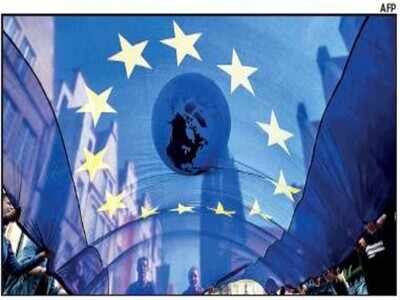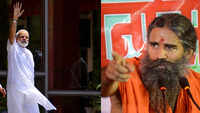
BRUSSELS: Populists and nationalists who want to chip away at the European Union’s powers increased their share in Europe’s Parliament after four days of continent-wide elections, but it was not the deluge that many traditionalists had feared.
When the vote counting is done, the populists are expected to get around 25% of the 751 seats, up from 20% five years ago, figures released by the EU showed on Sunday.
With more of a voice in Parliament, populists and nationalists would be expected to try to push harder on issues like controlling immigration and the budget.
And they are likely to try to gum up the plans of the pro-Europeans, pressing for more power to go to the nations rather than to a bureaucracy they consider elitist. Still, the anti-EU forces remain disparate and divided, and may have trouble wielding significant power.
Instead, the biggest impact was likely to be felt exactly where the far-right and populist leaders most wanted — in their home countries, particularly in France and Italy, where they are threatening to further disrupt traditional party systems and angling to gain power.
In France, the vote results on Sunday suggested a difficult time ahead for President Emmanuel Macron, who has presented himself as a champion of European integration. His slate for the European Parliament was being defeated by the National Rally party of Marine Le Pen, an outspoken critic of the bloc, according to final results. The defeat appeared to be by a small margin — but it would be enough to deal a symbolic blow to the young president. Le Pen called the result “a vote for France, and for the people.”
In Germany, where turnout was also high, the Greens did very well, becoming the main party on the left, while the Social Democratic Party did very badly, which may prompt the party to leave the existing coalition. The largest party, the governing Christian Democrats, also lost some ground, while the far-right populists, the Alternative for Germany, got about 11%. It appeared to be a weaker showing for the party than in the national elections of 2017, when it won 12.6%.
In the European Parliament, with the decline of mainstream parties and increased fragmentation, for the first time in 40 years the center-right and the center-left would no longer control a majority. Both lost ground, with centrist Liberals, Greens and the populists all gaining. While pro-European mainstream parties appear to have won about two-thirds of the seats, the center-right and center-left will have to cooperate in coalition with the Liberals, helped by Macron’s party, to form a sustainable majority. And the Greens, who did well all over the continent, will have a louder voice.
For the individual member states, the results were seen as judgments on the parties in power. In Belgium there was a big victory in the Dutch-speaking north of Flanders for Vlaams Belang, a far-right, anti-immigrant separatist party.
In Greece, after a bad defeat to conservatives, PM Alexis Tsipras, of the left populist Syriza party, called for early elections, probably to take place in June instead of October.
Italy was being watched to see how well its deputy prime minister, the rollicking populist Matteo Salvini of the League, did against his coalition partners, the Five Star movement. Salvini remains Europe’s champion proselytizer of the anti-immigrant far right. Salvini’s League came in first, with more than 34%, easily surpassing the minimum necessary to be considered a success, according to provisional results.
When the vote counting is done, the populists are expected to get around 25% of the 751 seats, up from 20% five years ago, figures released by the EU showed on Sunday.
With more of a voice in Parliament, populists and nationalists would be expected to try to push harder on issues like controlling immigration and the budget.
And they are likely to try to gum up the plans of the pro-Europeans, pressing for more power to go to the nations rather than to a bureaucracy they consider elitist. Still, the anti-EU forces remain disparate and divided, and may have trouble wielding significant power.
Instead, the biggest impact was likely to be felt exactly where the far-right and populist leaders most wanted — in their home countries, particularly in France and Italy, where they are threatening to further disrupt traditional party systems and angling to gain power.
In France, the vote results on Sunday suggested a difficult time ahead for President Emmanuel Macron, who has presented himself as a champion of European integration. His slate for the European Parliament was being defeated by the National Rally party of Marine Le Pen, an outspoken critic of the bloc, according to final results. The defeat appeared to be by a small margin — but it would be enough to deal a symbolic blow to the young president. Le Pen called the result “a vote for France, and for the people.”
In Germany, where turnout was also high, the Greens did very well, becoming the main party on the left, while the Social Democratic Party did very badly, which may prompt the party to leave the existing coalition. The largest party, the governing Christian Democrats, also lost some ground, while the far-right populists, the Alternative for Germany, got about 11%. It appeared to be a weaker showing for the party than in the national elections of 2017, when it won 12.6%.
In the European Parliament, with the decline of mainstream parties and increased fragmentation, for the first time in 40 years the center-right and the center-left would no longer control a majority. Both lost ground, with centrist Liberals, Greens and the populists all gaining. While pro-European mainstream parties appear to have won about two-thirds of the seats, the center-right and center-left will have to cooperate in coalition with the Liberals, helped by Macron’s party, to form a sustainable majority. And the Greens, who did well all over the continent, will have a louder voice.
For the individual member states, the results were seen as judgments on the parties in power. In Belgium there was a big victory in the Dutch-speaking north of Flanders for Vlaams Belang, a far-right, anti-immigrant separatist party.
In Greece, after a bad defeat to conservatives, PM Alexis Tsipras, of the left populist Syriza party, called for early elections, probably to take place in June instead of October.
Italy was being watched to see how well its deputy prime minister, the rollicking populist Matteo Salvini of the League, did against his coalition partners, the Five Star movement. Salvini remains Europe’s champion proselytizer of the anti-immigrant far right. Salvini’s League came in first, with more than 34%, easily surpassing the minimum necessary to be considered a success, according to provisional results.
Download The Times of India News App for Latest World News.
more from times of india news
Elections 2019
Trending Topics
LATEST VIDEOS
More from TOI
Navbharat Times
Featured Today in Travel
Get the app









